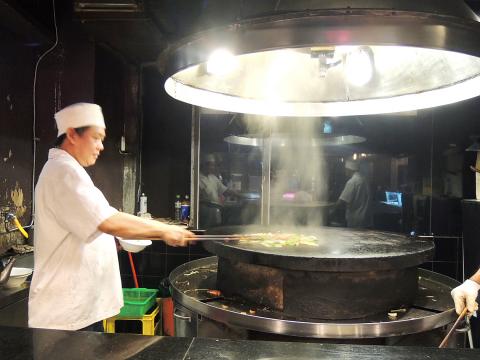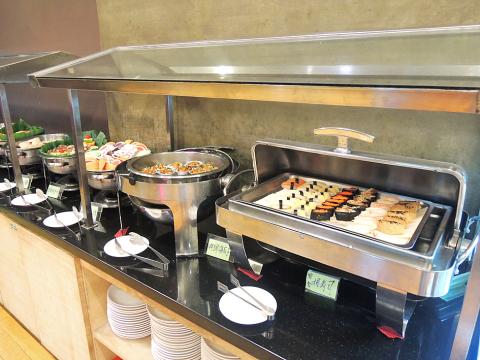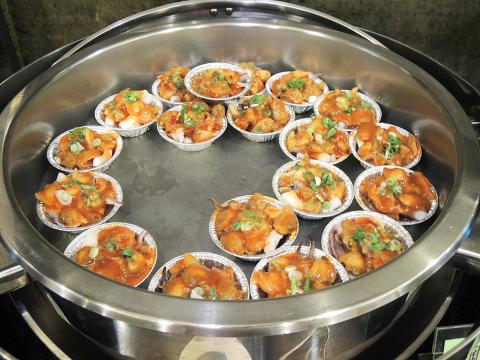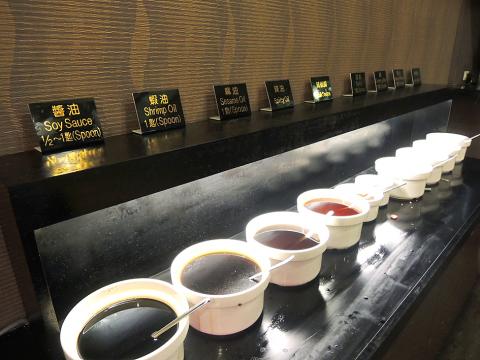Mongolian barbecue is not really Mongolian cuisine, and Genghis Khan of the Mongol Empire probably never had it while trying to conquer the world. And it has little to do with barbecue. The dish was developed in Taiwanese restaurants more than half a century ago, and the term was coined by legendary crosstalk performer Wu Zhao-nan (吳兆南) in 1951 when he opened a barbecue eatery in Taipei.
Established in the 1960s, Genghis Khan Mongolian Bar-B-Q is the oldest restaurant that specializes in the stir-fried dish today. It is about a 10-minute walk from Zhongshan MRT Station (中山站). The first floor of the two-story restaurant is closed during weekdays, so my family and I were seated at two round tables on the second floor for dinner.
At Genghis Khan, you first choose ingredients from a display of meats, vegetables and sauces to create your own bowl. You then hand it to a chef, who cooks it in front of you on a giant circular iron griddle. The restaurant provides four varieties of meat: beef, pork, lamb and chicken. They are thinly sliced and neatly piled in four containers on a counter. It also offers nine varieties of vegetables: basil, bean sprouts, cabbage, carrots, onions and green onions, pineapples, tomatoes and water spinach.

Photo: Eddy Chang, Taipei Times
I had some beef and lamb, and a little bit of everything from the vegetable counter, so my creation looked colorful. It is said that an enzyme in pineapple can tenderize meat, so I added a few slices to my bowl.
Next, I moved to the counter where various sauces were displayed. All the labels for the sauces are written in Chinese and English, with suggested amounts for each. A chef told me that soy-bean sauce, shrimp oil, sesame oil and rice wine were the most commonly used, so I took one teaspoon of each and added some garlic and chilies just to spice things up.
Finally, I handed my bowl to one of the two chefs at the semi-open kitchen next to the sauce counter. The chef skillfully stirred all the ingredients on the griddle and added some water to ease cooking. The sizzling sound and tempting smell immediately aroused my appetite. The chef said that the temperature of the griddle could be as high as 800 degrees Celsius, so they moved fast during the cooking process.

Photo: Eddy Chang, Taipei Times
Within a minute, my Mongolian barbecue was ready. The quickly stir-fried beef and lamb were quite tender with a robust meat flavor. Since the chef added some water during the stir-frying, the vegetables did not dry out. But I realized that I added too much soy sauce because my barbecue was a little too salty. A traditional way of eating Mongolian barbecue is putting it in a baked sesame seed coated cake. My cake was crispy and flavorful.
Apart from the Mongolian barbecue, additional buffet items were available, including a mini salad bar, a good selection of appetizers and seven dishes. My favorite appetizer was mixed meat jelly; the mix and chilled jelly-like broth were a good match. Other dishes on the night we dined included a nigiri sushi combo (綜合握壽司), seasoned Venus clams (特調海瓜子), boiled neritic squid (美味軟絲), sea bream with teriyaki sauce (照燒鯛魚排), free-range chicken with green onion oil (油蔥土雞), boiling water scalded shrimps (白灼鮮蝦) and abalone salad (鮑魚沙律). All the seafood dishes were fresh and well cooked. Genghis Khan also has a variety of drinks, desserts and fruit to finish off the meal — though the former two weren’t anything to write home about.
There are three prices for the dinner buffet: NT$520 for an adult, NT$270 for a child (between 110cm and 140cm tall) and NT$120 for a young child (below 110cm), along with a 10-percent service charge. For lunch buffet during weekdays, it is only NT$420 for an adult. Overall, Genghis Khan was an enjoyable dining experience, and its authentic Taiwanese-style Mongolian barbecue deserves a try.

Photo: Eddy Chang, Taipei Times

Photo: Eddy Chang, Taipei Times

May 11 to May 18 The original Taichung Railway Station was long thought to have been completely razed. Opening on May 15, 1905, the one-story wooden structure soon outgrew its purpose and was replaced in 1917 by a grandiose, Western-style station. During construction on the third-generation station in 2017, workers discovered the service pit for the original station’s locomotive depot. A year later, a small wooden building on site was determined by historians to be the first stationmaster’s office, built around 1908. With these findings, the Taichung Railway Station Cultural Park now boasts that it has

Wooden houses wedged between concrete, crumbling brick facades with roofs gaping to the sky, and tiled art deco buildings down narrow alleyways: Taichung Central District’s (中區) aging architecture reveals both the allure and reality of the old downtown. From Indigenous settlement to capital under Qing Dynasty rule through to Japanese colonization, Taichung’s Central District holds a long and layered history. The bygone beauty of its streets once earned it the nickname “Little Kyoto.” Since the late eighties, however, the shifting of economic and government centers westward signaled a gradual decline in the area’s evolving fortunes. With the regeneration of the once

The latest Formosa poll released at the end of last month shows confidence in President William Lai (賴清德) plunged 8.1 percent, while satisfaction with the Lai administration fared worse with a drop of 8.5 percent. Those lacking confidence in Lai jumped by 6 percent and dissatisfaction in his administration spiked up 6.7 percent. Confidence in Lai is still strong at 48.6 percent, compared to 43 percent lacking confidence — but this is his worst result overall since he took office. For the first time, dissatisfaction with his administration surpassed satisfaction, 47.3 to 47.1 percent. Though statistically a tie, for most

In February of this year the Taipei Times reported on the visit of Lienchiang County Commissioner Wang Chung-ming (王忠銘) of the Chinese Nationalist Party (KMT) and a delegation to a lantern festival in Fuzhou’s Mawei District in Fujian Province. “Today, Mawei and Matsu jointly marked the lantern festival,” Wang was quoted as saying, adding that both sides “being of one people,” is a cause for joy. Wang was passing around a common claim of officials of the People’s Republic of China (PRC) and the PRC’s allies and supporters in Taiwan — KMT and the Taiwan People’s Party — and elsewhere: Taiwan and